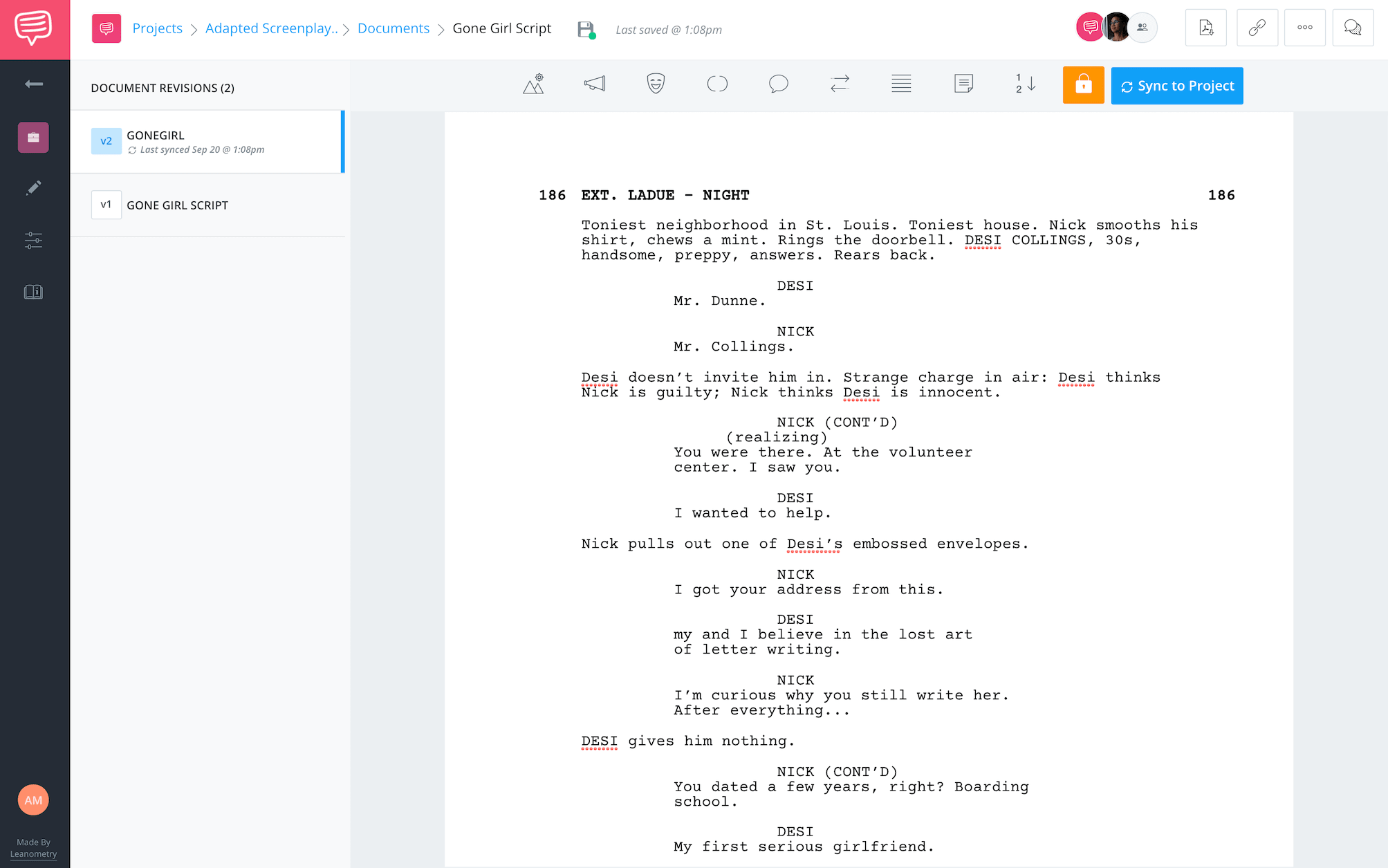So what is an adapted screenplay and what are the requirements for an adaptation? It’s obvious by the name that an adapted screenplay is well, adapted from something else, while an original screenplay is just that, originally created. But actually, even if you come up with an original idea, it may end up falling into the Academy’s category of Best Adapted Screenplay (if you should be so lucky).
Let’s see how this might be possible.
The Adapted Screenplay
Rules for best adapted screenplay
Maybe you have a great idea for a screenplay but it’s fully your idea, maybe it comes from a novel you love, or even a play. If you want to get involved in Hollywood, what are the stipulations for a proper adaptation, and how does the Academy determine it?
Adapted Screenplay Definition
What is an adapted screenplay?
An adapted screenplay is a screenplay that is based on pre-existing material. It is adapted from another source. The sources in which the screenplay is adapted from can range greatly. They can be anything from a novel, any other type of book, a memoir, articles, short stories, TV series, and even other films. It is not considered an adapted screenplay, if the filmmakers conducted their own research on a true story, but didn’t technically adapt what happened in history from a published source. The Academy of Motion Picture Arts and Sciences determines what is considered original and what is considered adapted, and this particular, prestigious Academy Award is given out each year.
Academy Award for Best Adapted Screenplay:
- All sequels are automatically considered adaptations
- All adaptations must be based from another source
- If it was previously produced or published in any form, it’s considered an adaptation (i.e. even if a short film was only made to make a feature, the resulting feature is an adapted screenplay)
So, an adapted screenplay has a few requirements aside from the obvious. If we take a look at the movie Spotlight, we know it was based on a very real story — real accounts, and real reports from the abuse of the Catholic Church. But because the script was written from research conducted by the screenwriters Josh Singer and Tom McCarthy, it was considered an “original” script.
Conversely, Damien Chazelle’s Whiplash, is a story from the mind and heart of Chazelle himself — an original idea that he created. But simply because he had already produced a scene from it, making the Whiplash short, the feature script and film is considered an adaptation of the short.
To make waters a little more murky, sequels are not considered original. It doesn’t matter how original the entire franchise is, all sequels are technically based off of something else, and therefore, considered adapted screenplays.
Regardless, of how the Academy crafts its rules, the screenwriter has quite the job when crafting his or her adaptation. Especially when that adaptation is a true story so incredible, it’s hard to even believe.
Below, you can listen to Luke Davies, the screenwriter of Lion, and winner of the Academy Award for Best Adapted Screenplay in 2017.
Luke Davies talks adaptations
Related Posts
Notable Adaptations
Adapted screenplay examples
Some other notable adaptations run the gamut of genres. But all include extraordinary historical and biographical tales that thanks to the writers, producers, and other filmmakers chose to revive them.
Writing an adaptation demands a keen sense of judgement, to balance drama with truth. The writer’s integrity is just as important as the story itself, to maintain accuracy, and a kind of rawness that engages the viewer and tells the story in the truest light. It’s not an easy feat. So below are examples from writers who didn’t just get thrown into the adapted category at the Oscars, these examples reflect those screenplayed that were truly adapted from another work.
12 Years a Slave (2013)
Written by John Ridley, this biographical period film is based on the 1853 slave memoir Twelve Years a Slave by Solomon Northup. Northup recounts his experience as a New York born free African American who was kidnapped and sold into slavery in 1841.
This script ended up winning the Academy Award for Best Adapted Screenplay at the 2014 Oscars.
Adaptation based on 1853 memoir
The Imitation Game (2014)
Adapted by Graham Moore from the 1983 biography Alan Turing: The Enigma by Andrew Hodges. The film focuses on Turing, (played by Benedict Cumberbatch), during his years as a cryptographer for the British military during WWII.Watch Graham Moore win well-deserved Best Adapted Screenplay
But they don’t need to win an Oscar to be considered an incredible adapted screenplay. And they don’t need to be adapting someone else’s work either.
Being a novelist turned screenwriter is not an easy thing to do. If you’re in the game, you already know screenwriting is a beast of its own.
Gone Girl (2014)
Gillian Flynn’s screenplay Gone Girl is incredible adaptation of her novel by the same name. This is a great script to analyze when you’re learning to write a screenplay. Going back to the novel, and seeing how Flynn structured the screenplay is a great lesson in how to write an adaptation.
Examining individual scenes isn’t a bad idea either if you’re trying to learn. Take a look at the Gone Girl screenplay below. Notice how efficient her actions lines are — Flynn doesn’t waste time with unnecessary logorrhea or wordiness.
Click to read entire scene
We know there is tension just from a few lines, and we can feel the energy between Nick and Desi. You can watch the scene below.
Watch how the scene came together
Writing adaptations isn’t easy whether you’re the writer of the original material or not. So if you’re in a position to write an adaptation, what should you consider?
Related Posts
Writing an Adapted Screenplay
Prepping for an adaptation
Before you start writing your adaptation, first things first. What are you going to adapt? If you're working on spec, you have the freedom to decide what material to work with. Logic suggests that it should be something already in your wheelhouse. But maybe you try something completely out of left field as an experiment.
Here's Gordy Hoffman from Blue Cat with some general advice on how to adapt a screenplay.
Adapting tips from BlueCat
Mining for material
What’s interesting to you. Better yet, what’s personal to you? It’s not always huge Hollywood biopics that make for great adaptations. Of course, if you’re interested in historical recounts, look to novels you love, or even older short stories.
Maybe there are ideas in there that have actually become relevant again in today’s socioeconomic and political climate?
Most people are more likely to want to go see something they already connect to, so basing your story off of a beloved book or writing a remake tends to win over producer and audience affection.
But before you start writing, make sure you have the rights.
Securing the rights
If you want to adapt something from the public domain, you’ll need to purchase the rights to the material. This can be hard to do if you’ve never done it before, or don’t have a team of people with money working for you. But it is also 100% possible.
Try getting in touch with the author or publisher of the material you want to adapt. Ask them if the rights are even available for purchase. There are quite a few companies that have web pages dedicated to who owns what. Use every resource you can if you hit a dead end.
Can’t seem to talk to anyone in publishing? Try directly reaching out to the author — it may seem nerve wracking, but some authors, especially those that aren’t super huge, may be able to start the negotiation process with you directly. Stephen King options many of his works to aspiring filmmakers, for a small fee.
Anything is possible, so try every avenue you can.
Tips from a Pro
Phyllis Nagy, adapted Carol, from Patricia Highsmith’s The Price of Salt (published under the name of Claire Morgan). Nagy describes her process of adapting a screenplay, which goes against some of the tricks many other writers swear by.
Screenwriter of Carol talks briefly on adaptation process
Flipping the Script
When Joel and Ethan Coen came out with O Brother, Where Art Thou? It was subsequently nominated for Best Adapted Screenplay in 2000. But was it an adapted screenplay?
There was a small credit in the film that stated it was based on Homer’s Odyssey. This was fascinating because had they not put that credit, no one would’ve known it was an adaptation. This all plays with the idea is anything really original? Technically, all creators are somewhat influenced from what they’ve already seen.
Another question remains: who decides what is original and what’s adapted? The Coen Brothers were able to steer the inevitable decision by a simple credit, without it, the Academy would have assumed this as an original script (because it kind of was).
And what about Whiplash, a completely authentic story created by Damien Chazelle is seen as an adaptation simply because he shot one scene as a short film. The politics of originality are interesting and strange. Luckily, we don’t need these labels to start writing. As long as the story is authentic to the storyteller(s) originality can exist whether it’s an “original screenplay” or an “adapted” one.Related Posts
UP NEXT
Secrets to writing better exposition
Exposition is one of the hardest skills to master as a screenwriter. They're incredibly important, but you don't want to say too much and risk telling the story, instead of showing it. Take a look at our next article, that gives some helpful tips on how to improve your exposition.

